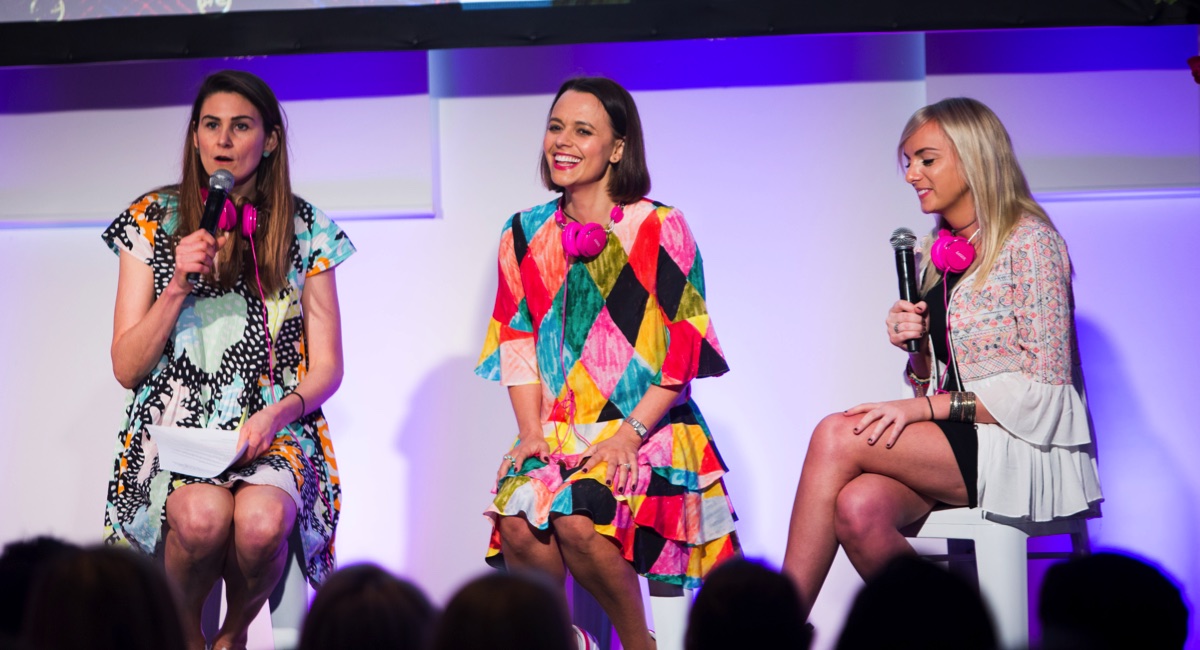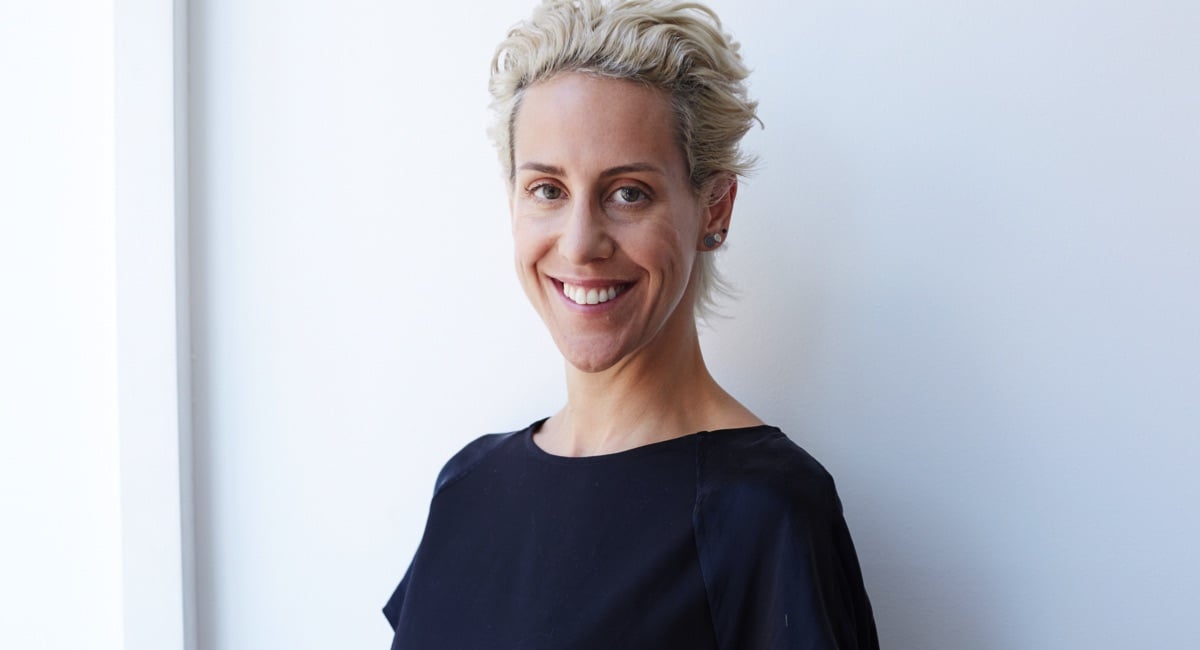Kylie Rogers heads up Australia’s largest women’s digital network. She said when she joined Mamamia it was a startup. In two short years, Rogers has turned it into an established business that is aiming to increase its reach to hundreds of millions of women worldwide. It’s all a part of what the company calls its “BHAG” – Big Hairy Audacious Goal. The statement is plastered on a wall in a brightly coloured meeting room at the Mamamia office in Sydney.
“We have undergone some significant growth since I arrived. I started at Mamamia in July 2014 as sales director and there were 30 staff,” Rogers told Mediaweek in a sit-down chat, after a quick tour of Mamamia’s HQ in Sydney. “I was then promoted to managing director in September 2015. Fast forward to today, we have roughly 120 full-time staff in New York, Brisbane, Sydney and Melbourne.
“Since I started as MD, I have really focused on sustainable growth – making sure that we have the right people doing the right things with the right strategies.”
Mamamia is engaging four million women every month. According to Rogers, who cited iTunes, the brand also has the world’s largest podcast network for women. The company’s first podcast series, Mamamia Out Loud, which featured Mia Freedman, Monique Bowley and Jamila Rizvi, was awarded the Best New Podcast by iTunes in 2015.
The Mamamia Women’s Network now produces up to 18 podcasts per week from its studios in Sydney and Melbourne. Rogers said the network has reached 12 million downloads so far and expects that it will have more than 20 million by the end of 2017.
Recently, Mamamia launched its latest podcast called Hello, Bump in partnership with Westpac’s Dear Bump campaign. Bowley and TV presenter Rebecca Judd host the new series. In just over 24 hours after its launch, the podcast was ranked #1 in the iTunes store, Rogers said.
Nine Entertainment’s lifestyle network 9Honey has also entered the podcasting space this year. Its first podcast series, called Sweet Spot presented by Katherine Feeney, was launched with the premiere of Married At First Sight.

The current Mamamia Out Loud team during the NewFront event in 2016: Monique Bowley, Mia Freedman and Jessie Stephens
Asked if she felt like the competition was heating up in the podcasting space nationally with the new entrant, Rogers said: “I have no doubt that everyone will follow. It would be mad if they didn’t follow. As a leader, you need to continue to push the boundaries and look for what is next and see how you can do things better and faster. Right now, we are focused on growing our stable and launching a women’s network in New York under the Spring St banner.”
Spring St is the name of the brand launched in the US by Mamamia. It was previously called Flo + Frank, but was rebranded as Spring St in the second half of 2016.
Mamamia’s podcast network in Australia is a revenue driver for the business. Rogers is expecting the same from the US podcast network in the near future. The primary aim for the Spring St Network is to have enough people listening to it on a regular basis for the company to take the offering to advertisers, Rogers said.
About the way Mamamia is monetising its podcast, Rogers explained: “The way we monetise today is pretty simple. It’s branded audio content, which is where we engage the right clients to talk to us about their products and key messages and we weave that into the content within the podcast – the host relays that story. That has been very successful for our clients. It receives 82% unaided ad recall. We are creating bespoke podcast series for the likes of Foxtel, Intel and Maurice Blackburn Lawyers, where it’s not their messages woven into the content but we are creating an entire podcast for them, around their content.”
Mamamia surveys over 30,000 women every year. Therefore, Rogers said that she is confident that the company knows the demands of its audience. However, she also said that being a digital company comes with its own challenges: “It’s our job to look forward and anticipate our consumers. If there is one thing we know for sure it’s that the digital landscape is ever-changing. It will be businesses that are agile and fast-paced that will thrive in that environment.”
These are both the qualities that she said Mamamia had, a number of times during the conversation. She continued: “None of us are fortunetellers so none of us can predict what technologies are going to launch to change the landscape even further.”
Mamamia has been dominating the digital women’s content space in Australia for a long time. In the last two years, as previously reported by Mediaweek, there have been launches of three women’s networks in Australia. These are Bauer Media’s To Love network, Nine Entertainment’s 9Honey, and the latest contender to enter the scene, News Corp’s Whimn.
“This is not new,” Rogers said. “We’ve had competitors come at us for the last 10 years including Bauer and Fairfax. They’ve all tried. They are all doing their bit. It’s a competitive world. I wish them all the best.
“Am I lying awake at night worrying about what Honey and Whimn are doing? Absolutely not.”
Mamamia has spent very little on marketing on traditional media platforms like radio, TV and newspapers so far. When asked if it is something that the company would like to do, Rogers smiled and said: “We’ve spent some time of late talking about the right promotional partners, not just for podcasts, but also for all our other products and assets. Mamamia has done very little advertising to its consumers – of course we do some digital marketing – but it’s time we stood up and looked at some traditional partnerships.”
Jamila Rizvi
Starting off as the managing editor of mamamia.com.au in 2012, Rizvi rose to the position editor-in-chief of the Mamamia Women’s Network by the end of her tenure with the company in 2015. The company had witnessed a significant growth in that time and Rizvi was there to experience this firsthand.
Following her departure from Mamamia, she joined News Corp as a columnist. She currently writes about politics and current affair on news.com.au and parenting articles for kidspot.com.au. Just before the launch of Whimn, the publisher also listed her as the contributor for the new digital destination.
Asked if she was concerned about Rizvi’s involvement with a competitor, Rogers said: “When you’re growing as significantly as we have been over the past few years, there will always be people who come and go from the business. We’ve never been reliant on any individual and all our business and editorial changes at such a significant rate – as women do – that it never bothers us if someone pops up at the competition. Any info they have is usually redundant within a very short time.”
Working for Ten
Rogers’ first job out of uni was with Network Ten – a company she stayed with for more than 17 years.
“I grew up there,” she said.
“I started when I was 21, met my husband there and have three children.”
Talking about what learning she brought from Ten to Mamamia, Rogers said it taught her the qualities of a good leader.
“It gave me the blueprint for what to do and what not to do,” Rogers said. “Over the 17 years that I was there – I worked in the Melbourne, Brisbane and Sydney offices in various roles – there were ups and there were downs.
“Number one for me is the importance of future-proofing the business and building genuine relationships with our consumers by understanding what they want. They were the two things arguably in the few years prior to me leaving I felt weren’t happening enough.”
New content categories
Mamamia announced it will be launching four new content pillars this year, which are sports, finance, travel and automotive.
The sports vertical launched at the beginning of the year. Mamamia struck a partnership with AFL.com for the AFL Women’s League.
The sporting body is also sponsoring two of Mamamia’s podcast series.
The other new content categories will be rolled out in the order listed above.
Unpaid internships at Mamamia
“It’s so not a thing,” Rogers said, answering the frequent questions raised in the media about Mamamia not paying its interns and freelance writers. “We pay all our interns, staff and freelancers.
“It’s exhausting that we continue to get this feedback. I can assure you that we pay everyone.”
On other criticisms faced by the brand, Rogers said: “I ignore them. You have to. You can’t have everyone loving your product. If we get our women talking to us about how to improve our product in an interesting, meaningful and authentic way, we do so. We are continuously improving our product.
“In terms of trade critics, we cannot give it oxygen and worry about it. We ignore it. It’s heads down, bum up.”
